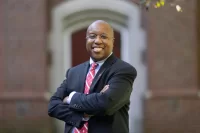Land-mine eradication advocates to lecture at Bates
In the wake of Princess Diana’s death, renewed interest has been given to land-mine eradication, a cause she promoted with appeals to world leaders and hospital visits with victims.
Julie Groom-Thompson ’80, executive director of the Maine Mid Coast Chapter of the American Red Cross, and David Kuhns, a physician’s assistant who has treated land-mine victims in Afghanistan as a member of Doctors Without Borders, will give a presentation on land-mine eradication at 7 p.m., Sept. 22, in the Edmund S. Muskie Archives, 70 Campus Ave. The public is invited and admission is free.
In April, Groom-Thompson led a coalition encouraging the Maine Legislature to pass a joint resolution calling for the federal government to ban the sale, production and distribution of land mines. Maine was the first state in the nation to pass such a resolution. Representatives from the U.S. government are now in Oslo, Norway, negotiating an international treaty to prohibit use of land mines.
Land mines worldwide kill or maim 2,000 people each month, according to Groom-Thompson, and the vast majority of victims are civilians– women and children engaged in agricultural work or gathering food and firewood.
While most of the 119 million land mines currently buried each cost $4 to manufacture, up to $1,000 must be spent to locate and deactivate a single land mine. For every 5,000 mines cleared, one deactivator is killed and two are injured.
Countries most plagued by the devices include Afghanistan, Angola, Mozambique, Somalia and Cambodia, where one of every 236 people is an amputee as a direct result of land mines, said Groom-Thompson.
Groom-Thompson lives in Falmouth and has been executive director of the Mid Coast Chapter of the Red Cross for 11 years. Kuhns lives in Cumberland and works at Maine Medical Center and Mercy Hospital. He was the first physician’s assistant accepted to Doctors Without Borders and spent nine months treating land-mine victims in Afghanistan in 1995.



